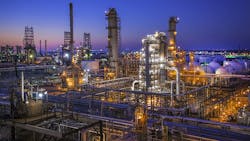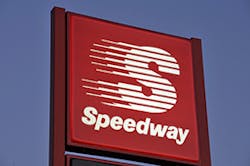Ask anyone in an oil company – it’s a cyclical business. When oil prices are high, it’s a huge moneymaker. But when prices are low, the black flow of oil can quickly turn to the red ink of losses.
Marathon Petroleum Corp. (IW 500/10) understands those dynamics well and has been taking steps to smooth out these ups and downs. In a recent briefing at Marathon’s headquarters in Findlay, Ohio, Don Templin, president of MPLX, Marathon’s pipeline and logistics operation, and executive vice president of Marathon Petroleum, described the two main elements of the company’s strategy.
First, the company wants to make its refining operations more efficient. Marathon has seven refineries that process about 1.8 million barrels of crude a day. The refineries are spread between the Midwest, the Louisiana Gulf and the Texas Gulf. That geographic dispersion, says Templin, helps the company not only “meet market demands but also ride out some of the volatility” in the downstream oil business.
Marathon is in the midst of increasing the efficiency of its two refineries in Texas that literally sit across the street from each other – Texas City and Galveston Bay. Marathon purchased Galveston Bay, formerly a BP facility, in February 2013. While Texas City, a relatively small facility refining 90,000 barrels a day, has outsized tank capacity for its volume, the Galveston Bay refinery, which produces 450,000 barrels a day, has less tank capacity than its size warrants. Marathon’s solution is to run them as an integrated facility by building piping between the two refineries to optimize use of the tanks and the processing facilities.
Templin said Marathon will invest about $2 billion over the next five years to improve and integrate operations at the two refineries. By 2022, he said, that investment will return an expected $730 million of annual incremental EBITDA.
Marathon also is changing the product mix in its refineries, increasing the amount of diesel it produces compared to gasoline to meet projected greater demand for diesel.
The company is also taking steps to increase its export capabilities. Templin noted that Marathon’s use of domestic natural gas gives it a huge price advantage over European refiners.
“Every dollar change in natural gas prices has sensitivity to us of about $140 million after tax,” he noted. At current prices, that means compared to a European refiner of the same size, Marathon enjoys a $1 billion annual manufacturing advantage.
“We are actually producing more refined products than we consume in the U.S.,” Templin pointed out. “We are importers of crude but what has allowed U.S. refiners to operate at high utilization is the export market and we don’t see that changing over the near term.”
In December, Marathon took another step to smooth out its income generation when it completed its purchase of MarkWest Energy Partners, the nation’s second-largest processor of natural gas and the largest processor and fractionator in the Marcellus and Utica shale regions. MarkWest will operate as a unit of MPLX.
MarkWest is a midstream firm whose business starts at the wellhead, where it gathers gas and transports it to a processing facility. There the natural gas is separated from natural gas liquids. In ensuing fractionating operations, the company separates the natural gas liquids into components such as ethane, propane and butane. MarkWest then markets these products for the natural gas producers, earning a fee for these services.
Growing Retail
The changes in refining and expansion of Marathon’s midstream business are being completed in tandem with moves to expand Marathon’s retail business. While the familiar Marathon gas stations have long-term supply arrangements with the oil company, the 5,600 stations are owned by individual businessmen. But these stations aren’t the company’s only retail outlets. Marathon also owns the Speedway chain of stations.
Speedway has 2,770 locations in 22 states, a number boosted significantly in 2014 when Marathon purchased more than 1,200 locations from Hess Corp. Marathon expects to complete the transition of these sites to the Speedway brand by the end of 2016. Of Marathon’s 45,000 employees, approximately 35,000 are employed at Speedway.
Marathon’s strategy is to continue growing its retail outlets, which are heavily concentrated east of the Mississippi, in Pennsylvania and Tennessee while seeking to fill in gaps in Georgia, South Carolina and the Florida panhandle. Templin said the company seeks “density” in its retail operations to “be able to drive some of the efficiencies we typically would get,” he said, explaining the company will both build and acquire sites.
The Speedway stores earn about 2/3 of their margins inside the store, so they help reduce Marathon’s exposure to changes in pump prices. Templin said the retail business not only provides a more stable income flow but the EBITDA it generates ($952 million in 2015) helps the company maintain its investment grade credit profile.
Marathon’s stable of businesses are certainly diverse, which Templin says is an asset as it competes with perceived “sexier brands” in the search for talent.
“I can offer you an opportunity to move around the United States. I can offer you an opportunity to participate in all sorts of businesses,” Templin said, adding that the company’s growth allows it to offer new employees the chance to get involved in business development, acquisitions and capital markets. And when employees join Marathon, they tend to stay, he noted, citing the company’s 2% attrition rate outside of retirement.
For those college graduates joining Marathon, they will find a headquarters changed in part to be more attractive to millennials. The company announced an expansion of its Findlay campus in February 2014 and construction began just three months later. Marathon is adding an administrative building, a headquarters for MPLX and two attractive garages, consolidating parking and freeing up an area to be turned into green space to create more of a campus atmosphere. The company is also breaking ground on a 100-room hotel that will serve not only Marathon employees and guests but the Findlay community.
About the Author
Steve Minter
Steve Minter, Executive Editor
Focus: Leadership, Global Economy, Energy
Call: 216-931-9281
Follow on Twitter: @SgMinterIW
An award-winning editor, Executive Editor Steve Minter covers leadership, global economic and trade issues and energy, tackling subject matter ranging from CEO profiles and leadership theories to economic trends and energy policy. As well, he supervises content development for editorial products including the magazine, IndustryWeek.com, research and information products, and conferences.
Before joining the IW staff, Steve was publisher and editorial director of Penton Media’s EHS Today, where he was instrumental in the development of the Champions of Safety and America’s Safest Companies recognition programs.
Steve received his B.A. in English from Oberlin College. He is married and has two adult children.

